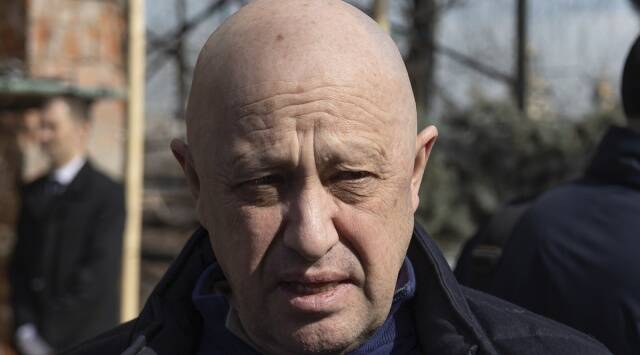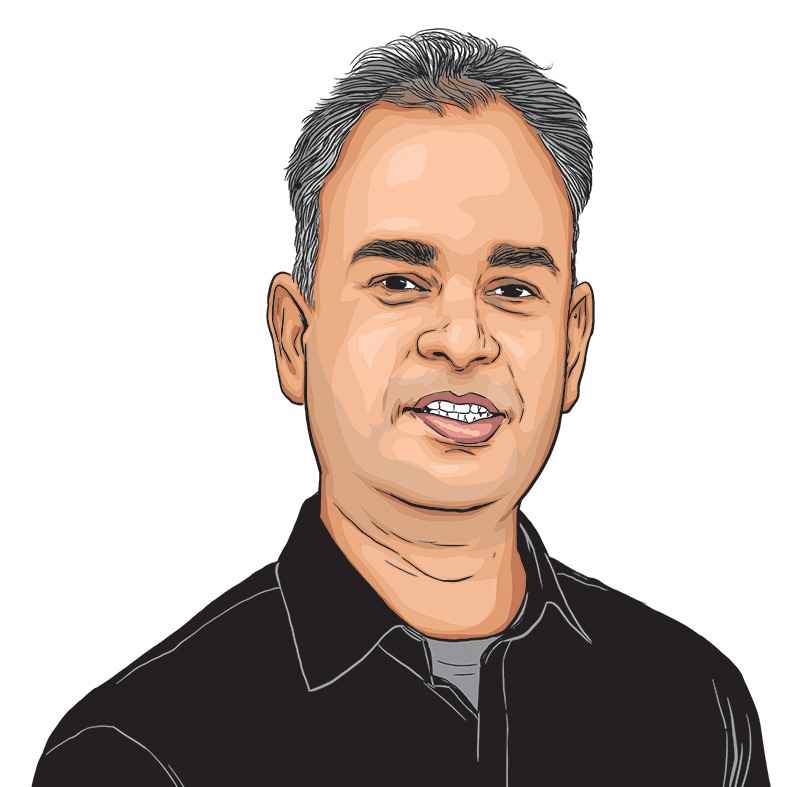Opinion The Wagner Coup in Russia: Why did Putin offer Prigozhin a safe exit?
The Wagner insurgency has brought internal strife into the public domain. In the 23 years of his presidency, Putin has never faced a crisis of this proportion
 Yevgeny Prigozhin, the owner of the Wagner Group military company, arrives during a funeral ceremony at the Troyekurovskoye cemetery in Moscow, Russia, on April 8, 2023. (AP/File)
Yevgeny Prigozhin, the owner of the Wagner Group military company, arrives during a funeral ceremony at the Troyekurovskoye cemetery in Moscow, Russia, on April 8, 2023. (AP/File) The Wagner insurrection manifested a rivalry between Vladimir Putin’s establishment and a new power centre emerging in Russia. The war in Ukraine has elevated the profile of Yevgeny Prigozhin, the leader of the Wagner group, a private army of mercenaries fighting alongside Russian forces in Ukraine. He launched an armed insurrection and ordered his forces to march towards Moscow in a blatant show of strength. He also took control of two southern cities, including Rostov-on-Don, a military base from where Russia launched its offensive in Ukraine. President Putin quickly addressed the nation and denounced the mutiny as “treason” to be punished severely. With a lot of drama and military posturing, the two sides struck a deal, mediated by President Alexander Lukashenko of Belarus, which offered an exit plan for Prigozhin and perhaps a promise of reform in Russia’s military leadership.
The entire episode raises a few pertinent questions. Why did Prigozhin decide to launch an armed offensive when the chances of success were meagre? And then, what led him to come to the negotiating table? Why did Putin offer an exit option to a person denounced as a “traitor”? And finally, is Putin’s regime under a real threat?
The crisis erupted when Prigozhin accused the Russian military of killing many of the Wagner forces by striking at a camp. Kremlin denied these charges as a mere provocation. Tensions between the Wagner group and Russia’s Ministry of Defence have been simmering for a while. On many occasions previously, Prigozhin criticised Sergei Shoigu, Russia’s Minister of Defence, and Valery Gerasimov, Chief of the General Staff, for their ineptitude and mishandling of the war in Ukraine. The Kremlin tolerated this because Wagner mercenaries delivered on the battleground, including the capture of Bakhmut last month. But this time, Prigozhin crossed the red line and questioned the motives of Russia’s invasion of Ukraine, probably in an attempt to mobilise people in Russia. He accused the Ministry of Defence of hyping the NATO invasion and pushing Russia into the war. Such statements coming from a Kremlin-insider, and a person with high credibility, raised the alarm in Moscow.
Despite his dubious past, Prigozhin has become a trusted public figure in Russia. The official media rarely featured Prigozhin, but his videos circulated widely on social media, especially on a Telegram channel. In a survey conducted by Russian Public Research Centre a few weeks earlier, he ranked fifth in the list of most trusted Russian public figures. He ranked above the Defence Minister, Sergei Shoigu, in that list. He also received accolades at the prestigious St Petersburg International Economic Forum as a “trendsetter of the year” two weeks ago. Putin attended the event.
Prigozhin’s popularity and his anti-establishment outbursts became a severe concern for Putin. The Kremlin feared the emergence of a rival power centre with the intent, legitimacy and capability to challenge the regime. Consequently, Russian forces distanced themselves from the Wagner group and probably attacked it too. Fearing annihilation and left with no choice, Prigozhin decided to fight back and mobilise Russian public opinion. The coup attempt was a part of this strategy.
The negotiations and exit have temporarily solved the problem for both sides. The Kremlin will not be blamed for eliminating a war hero, and Prigozhin residing in Belarus would not directly threaten Putin’s regime. It is common practice in Russia that oligarchs who love favour with Putin live outside the country. The West is not an option for Prigozhin as he is labelled a war criminal.
Prigozhin is a classic example of the dark side of Russia’s crony capitalism. Politically-connected individuals looted state properties and made fortunes through contracts. A former child convict who spent several years in jail, Prigozhin began his catering business in St Petersburg in the murky 1990s. He ventured into the private military business in 2014. His first major assignment was in Crimea, where he provided logistics support and worked unofficially with the Russian forces. The advantage of having the private military was that rules and discipline did not bind it. It worked with impunity, and many believe that Wagner fighters engaged in secret operations. Further, when Russia intervened in Syria in 2015, the Wagner mercenaries fought alongside Russian forces and provided logistics support to them. With Moscow’s blessings, the group expanded its outreach to Mali and the Central African Republic. Prigozhin’s net worth is estimated to be $1 billion.
Prigozhin’s successes on the battlefield, especially when the Russian army was struggling, created hubris. He started treating himself as the saviour of Russia and his army as an indispensable force. His ambition grew, and he aspired for a higher position in the establishment.
Prigozhin’s fate has been sealed and the Wagner rebellion has been silenced – but the damage is done. Putin’s control over the military and society will increasingly come under scrutiny. By offering a safe exit to Prigozhin, Putin exercised the pragmatic option. However, the questions Prigozhin raised about the motives of war remain unanswered. One also wonders about the fate of the Wagner forces now.
The Wagner insurgency has brought internal strife into the public domain. In the 23 years of his presidency, Putin has never faced a crisis of this proportion – a close confidante turning Frankenstein. Putin’s regime appeared to be on a sticky wicket for the first time. Russia’s political stability came under threat. This episode must have demoralised the Russian forces fighting in Ukraine.
If Russia’s history offers any lesson, it is that challenges to regimes come from within. Boris Yeltsin was an insider when he led the forces of disintegration against Gorbachev in 1991. Fortunately, Russia is not facing that kind of crisis now.
The writer teaches at the School of International Studies, Jawaharlal Nehru University. Views are personal



